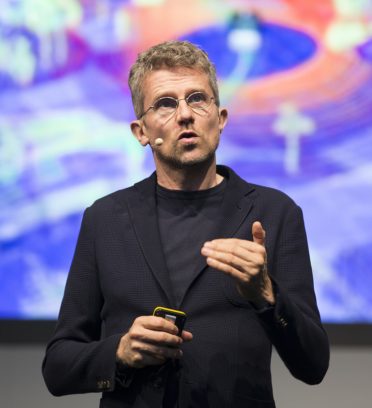
Carlo Ratti is the director of the “Senseable City Lab” at the Massachusetts Institute of Technology.
1 How New Forms of Mobility are Changing Cities
How are the new forms of mobility changing our cities? Externally, not very much; however, they can lend them a new spirit – according to the credo of the Italian architect and visionary Carlo Ratti. As the director of the “Senseable City Lab” at the Massachusetts Institute of Technology, he develops new approaches to mobility. Why? Because nothing has shaped the look of cities in the 20th century more than cars. Cars, which nowadays lie unused 95% of the time every day. “There are estimates that every car used collectively, i.e., via sharing systems, could replace between ten and 30 privately owned cars on the streets,” said Ratti. Such dynamics could increase exponentially – almost indefinitely – with the establishment of self-driving cars. That in turn would have a dramatic influence on urban life: “The lines between private and public forms of transportation are starting to become blurred. That could lead to a city in which – at least theoretically – anyone can be transported upon demand with a fraction of the cars that are on the road today.”
↑ Carlo Ratti on Internet of Things
2A Lot of Potential Can Be Found in Assistance Systems
How will cars communicate with people in the future? For this, Prashanth Halady demonstrated some amazing perspectives. For example, controlling cars solely though glances in the near future is by no means a utopia. However, there is still enormous potential in the driver assistance systems that are already currently in use. The director of the Global Center of Competence for Human-Machine Interaction from Bosch presented a recent study carried out by his company according to which 260,000 accidents with personal injuries and 400,000 metric tons of CO2 emissions can be avoided globally by as early as 2025 if we continue to focus on networked and assisted driving. For Germany alone, the analysts have calculated 30,000 fewer accidents per year. Globally, 4.43 billion euro in damage costs would be saved. Not to mention the time saved due to an improved flow of traffic.
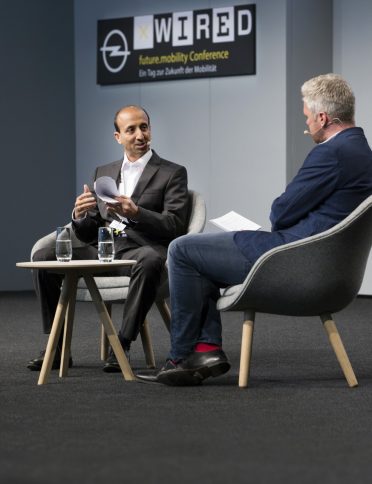
Prashanth Halady Director of the Global Center of Competence for Human-Machine Interaction, Bosch.
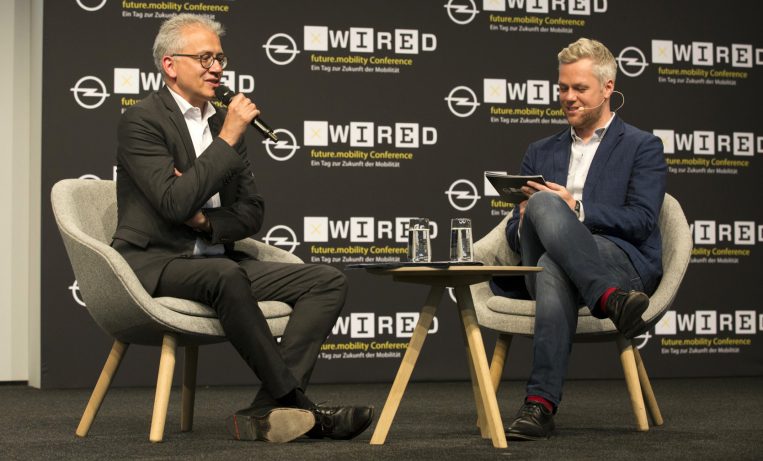
Tarek Al-Wazir Hessian Minister of Economics, Energy, Transportation, and Regional Development sat down to talk with moderator Lars Gaede.
3 “Major Goals are Important, Because They Create Pressure.”
Tarek Al-Wazir no longer believes that a million electric cars will actually be driving around Germany by 2020 as the federal government had once targeted. However, the Hessian Minister of Economics, Energy, Transportation, and Regional Development continues to think that “setting such major goals” is the right thing to do “because it creates pressure.” However, it should not be a burden for the automobile industry alone. Tarek Al-Wazir is aware that the government also needs to contribute by creating an extensive charging infrastructure for electric cars.
The task of car manufacturers is to create trust: “Customers can’t keep thinking that they could drive an electric car for only 200 kilometers before they would have to take a four-hour break to recharge their car’s battery.” In the minister’s opinion, electric cars are also better suited to the future-oriented “sharing economy.” It could relieve congested urban areas enormously, however, it would also have to be promoted in rural areas with fresh ideas. “Offering local public transportation everywhere is already no longer within the realm of possibility.” There as well, car sharing would be a future concept for solving the growing mobility problems.
4A Flat Rate for Cars? Only One of Many Potential Varieties of Mobility
“How important is the make and model of car you are sitting in if you yourself are not the driver?” Marcus Willand, consultant for Porsche’s subsidiary MHP, asked this provocative question. He calls autonomous driving a “game changer”: i.e., the development that will lead to the most fundamental changes, at societal levels as well. “The mobility industry is a booming market that will grow exponentially thanks to autonomous driving. This will not only change personal transportation – this will alter the transportation of goods to a much greater extent,” added Willand. A small indicator of the societal effects that this development could have: “In about 40 states in the US, truck driver is the most common job.” The consultant emphasized potential future varieties of mobility. It could result in completely new fleets: Instead of taxis, special autonomous shuttles would take over the patient transportation to hospitals (Willand: “A Million Euro Market”). Mobility could also become a kind of additional service: When booking a movie ticket, a surcharge could be added for the autonomous shuttle to pick you up at your door. Or the variation based on cell phone contracts: For amount X, you get the mobility flat rate.
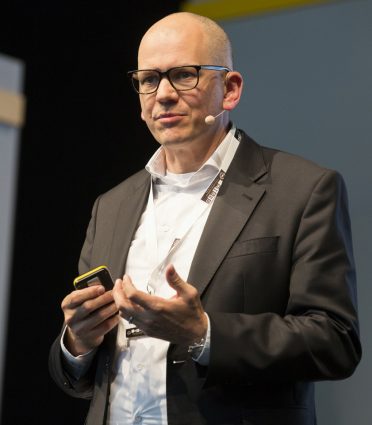
Marcus Willand MHP – A Porsche Company
Smartphone equals car, free minutes equals kilometers. Willand: “A mobility flat rate like this is not a distant dream. It has already been offered. The demand was so great that the provider had to suspend the offer.”
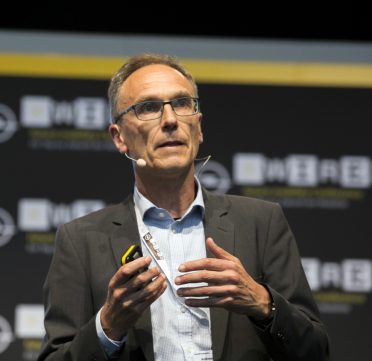
Dr. Andreas Herrmann Marketing Professor at the University of St. Gallen.
5
Jerusalem Instead Of Detroit: Shifts in the Parameters of the Automobile Industry
If you are dealing with the future of mobility, a status quo can be helpful: How many cars are there in the world? 1.2 billion. How many kilometers do these cars drive per year? 16 trillion kilometers – 108,000 times from Earth to the Sun. Dr. Andreas Herrmann used these numbers in order to illustrate “how strong the desire for mobility will grow for nearly seven billion people on Earth.” For 130 years, people simply thought of the car in the same way – buy it and drive it. The next stage lies ahead – sharing and letting others drive it. What potential does autonomous driving harbor? Herrmann: “94% of accidents can be traced back to human error.” By implication, a majority can be avoided. The mobility market is immeasurable according to the marketing professor: “Internet giants like Google and Amazon are making preparations.”
The consequences are fundamental: The heavyweights of the automobile industry today are located in the United States and Germany. The future heavyweights could have their headquarters in China or Israel, where pioneers of IT and high-tech industry are concentrated. The danger that he sees for automobile manufacturers is in their status being reduced to that of a supplier.
6“Algorithms Also Come from Rüsselsheim.”
“Germany is not going to be a pioneer when it comes to e-mobility.” This sentence comes from Burkhard Milke. He is the Director of Electrical Systems at Opel. He is not saying this with resentment or disappointment; it is simply a fact: “We Europeans do not have any pressure to innovate.” People are not going to rip up the streets in Frankfurt and install induction loops, for example. Things are different in China. There, completely new cities are developed on the drawing board, designed according to the needs of e-mobility and autonomous driving.
Moderator Lars Gaede wants to know how far Opel has come along in matters of autonomous driving. “Unfortunately, I cannot let you have a look in the cards. But I can say: We at ITEZ are assuming a global responsibility and if cars in Silicon Valley are driving autonomously, you can assume that some of the algorithms are coming from Rüsselsheim,” said the director. The fact that autonomous driving will gain acceptance is beyond question for the director: “On the contrary: People will find it irresponsible to drive their cars themselves.”
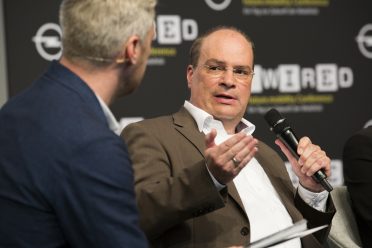
Burkhard Milke Director of Electrical Systems at Opel.
In part 2 of the most important messages
from the OpelxWIRED conference:
Dr. Lena Rittger, Opel Project Manager of Driver Performance Advanced Technology, discusses the following topic: We are teaching cars how to drive autonomously, however, how to we convey this to people? Technology philosopher Janina Loh from the University of Vienna discusses the question of who is liable when two self-driving vehicles collide. In addition, the future researcher Sven Gábor Jánszky predicted how we will live, work, and travel in the year 2027. Last but not least, the future design was addressed. Opel’s head designer Friedhelm Engler discussed this topic with professor Lutz Fügener from the University of Pforzheim and Alexander Mankowsky from Daimler.